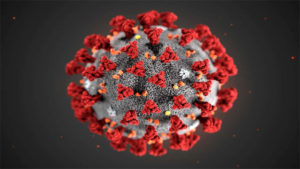 Chief Medical Officer (CMO) Dr. Hazel Laws, announced during a Special NEOC COVID-19 Press Briefing on Saturday, June 26, that the new COVID-19 strain that was picked up in St. Kitts and Nevis in May 2021, is identified as the Lambda variant.
Chief Medical Officer (CMO) Dr. Hazel Laws, announced during a Special NEOC COVID-19 Press Briefing on Saturday, June 26, that the new COVID-19 strain that was picked up in St. Kitts and Nevis in May 2021, is identified as the Lambda variant.
In early June, the Ministry of Health sent samples to the Caribbean Public Health Agency (CARPHA) for genomic sequencing to determine the variant of the SARS-CoV-2 virus that is presently in circulation.
“The report says that the SARS-CoV-2 variant belongs to the lineage B.1.1.1 or C.37. The World Health Organization label for this variant is the Lambda variant. So this is the variant that is in circulation in the Federation,” said CMO Dr. Laws. “The Lambda variant is classified as a variant of interest by the World Health Organization.”
The Lamba variant, which has been identified in 29 countries, was first identified in Peru in August 2020. Dr. Laws said it is “quite prevalent in the South American countries including Argentina.”
At a recent COVID-19 Press Briefing, Dr. Laws noted that the new strain is more transmissible than the strain we contained last year between March-July and it is also more deadly.
CMO Dr. Laws continues to encourage the general public to boost their immune systems, eat healthily, and exercise regularly. For persons who have tested positive for COVID-19, she also encouraged them to boost their immune system, make sure they consume healthy meals, maintain adequate hydration with water, and if possible, engage in some form of physical activity in an effort to facilitate a speedy recovery.
St. Kitts and Nevis COVID-19 Situation Report No. 457 as of Saturday, June 26, 2021, states that the total number of confirmed positive cases now stands at 428 with 313 active cases, 112 recovered cases, and three deaths. Four hundred and thirteen (413) of those cases were recorded in St. Kitts while 15 were registered in Nevis. To date, there have been 20, 427 negative results.
The Federation’s vaccination programme has been making steady progress. As of June 26, 2021, 38,006 total doses were administered representing 68.6 % of persons who have had at least the first dose, while 15, 350 persons have received their second dose amounting to 46.5 percent. In order for herd immunity to be achieved 70 percent of the total adult population, which equates to 33, 037 must be fully vaccinated.
